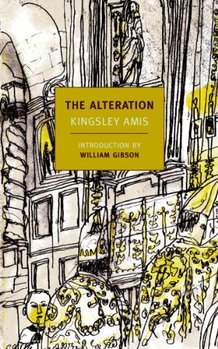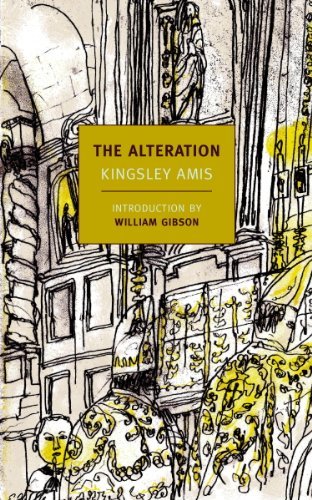
When you come across the name Kingsley Amis (1922-95) you don’t expect to find it associated with science fiction. A novelist, poet, and literary critic, Amis is probably best known for his first published novel, Lucky Jim, which appeared in 1954. The book won a major literary award and is frequently included on reading lists in English literature classes. His much later novel, The Alteration, published in 1976, is far less likely to be recommended reading for college students. But it has somehow captivated William Gibson, one of our era’s leading lights in science fiction. And, reading it, I can understand why.
Estimated reading time: 4 minutes
In his introduction to the 2013 reprint edition of the novel as a New York Review of Books Classic, Gibson refers to it as “one of the finest, most rigorously executed of all parallel-world novels.” Someone like myself who’s less familiar with literary jargon is likely instead to term it an example of alternate history, which indeed makes more sense to me. An alternate history of the Church, to be precise.
The Alteration by Kingsley Amis (1976) 257 pages ★★★★☆
An alternate history of the church
Amis’s tale is set in 1976, the year of its publication. But the roots of the story lie in the early sixteenth century. In 1517, priest and theologian Martin Luther famously kicked off the Protestant Reformation, triggering centuries of often-bloody conflict between Catholics and Protestants. But in The Alteration, Luther instead has cut a deal with the Vatican and become Pope Martin I. The consequences that flow from that accommodation are dramatic.
Science is a dirty word
Undeterred by civil strife, the Church has mustered the strength to suppress the scientific revolution and thus the Enlightenment. Science is a dirty word in the world of this novel.
The Pope is the world’s most powerful person
England has remained Catholic, and its vast empire continues to heed the word of the Vatican. Only in the Republic of New England, where English Schismatics have congregated, has a spirit of innovation taken hold. Yet they all ultimately must answer to the Pope, the world’s most powerful person.
An endless holy war between Rome and the Turks
Rome is perpetually engaged in a Holy War with the Turks over territory in the Balkans.
London houses just one million
Urbanization has been limited by the pull of tradition throughout the countryside. For example, London is a city of little more than one million people (as opposed to the 7.5 million who lived there in the 1970s).
“A world lit only by fire”
Yet the world of 1976 in The Alteration is a world lit only by fire, to steal a phrase from William Manchester‘s magnificent 1992 study of medieval Europe and the Renaissance. And horse-drawn vehicles are still common on the streets and roads along with diesel-powered trucks, taxis, and “express-omnibuses.” Trains (“railtrack trains”) connect the cities.
Is ten-year-old Hubert to be “altered?”
The protagonist of The Alteration is ten-year-old Hubert Anvil, the star soprano of the choir at a Benedictine monastery in England. Hubert’s fame is so great that the director of the Sistine Choir has come to hear him sing. And Hubert now becomes the subject of intense interest from the Abbott to the boy’s parents and the Pope. The question is whether he is to be “altered,” that is, to be subjected to surgery that will castrate him to preserve his voice forever. And Amis adroitly builds suspense as the contending forces jockey for advantage. The Alteration is a deeply satisfying excursion into a past that might have been. It’s an alternate history of the Church, but it’s also a touching story of a young boy’s life in a dystopian tyranny.
For related reading
Take a look at 10 best alternate history novels.
For more good reading, check out:
- These novels won both Hugo and Nebula Awards
- The ultimate guide to the all-time best science fiction novels
- 10 top science fiction novels
- The top 10 dystopian novels
- Ten new science fiction authors worth reading now
And you can always find my most popular reviews, and the most recent ones, on the Home Page.


























